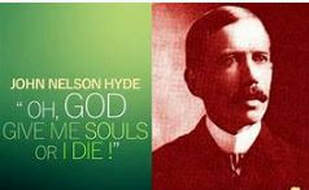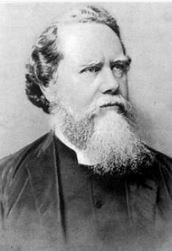 There were several things today the Lord brought together that challenged me. How close am I to the heart of Jesus? I sat with Tim this morning talking about how we can best present Lesson 13 of our book, God’s Plan for His Disciples, to attract disciples into a daily quiet time with the Lord. Then I was reading a couple pages of “Praying Hyde” again. He made me realize how few there are who are near enough to Jesus that they know the Father’s heart for the lost. Paraphrasing some of what Hyde said is; we do not need a broken heart for the lost so much as we need to know the Father’s heart. It is not that we need to suffer more as we need to “share in the sufferings” of Christ (Philippians 3:10). This gives us insight into why He suffered for us and all mankind. Of all the disciples, John seemed to be the closest to Jesus. When Jesus revealed that one of the twelve was going to “betray” Him, John, “leaning back against Jesus said to Him, “Lord, who is it?”” (John 13:21, 25). John’s tenderness toward his Master was not a sudden development. There are other evidences that he had grown closer over the three and a half years. My deepest concern for myself and for you is not that we suffer for being faithful or stand firm in the Word of God, but that my walk in the Word draws me closer to the Person. If this does not happen, we will not know His heart nor the Father’s heart. Without this nearness, we will pursue things that do not produce fruit or glorify Him, and we will waste time and resources He gave us. HOW CLOSE ARE YOU TO HIS HEART?
0 Comments
Jesus pointed out that John the Baptist’s ministry upset the status quo. “From the days of John the Baptist until now the kingdom of heaven has suffered violence, and the violent take it by force” (Matthew 11:12). His preaching of repentance was not at all popular with the religious leaders, and neither is repentance popular today. Several meanings have been taken from this verse, but the purpose of this blog is to focus on what happens in our lives when repentance takes place and we really want God to work.
Throughout the New Testament we are taught that violence is required to deal with the flesh and our stubborn wills. Paul uses the term “put to death” (Colossians 3:5) or “crucified” (Romans 6:6; Galatians 2:20; 5:24). These are words that have little meaning unless we are very serious about wanting the kingdom of God (His rule) to reign in our minds and hearts. Jesus makes a strong requirement for those who wanted to follow Him; “And calling the crowd to him with his disciples, he said to them, “If anyone would come after me, let him deny himself and take up his cross and follow me” (Mark 8:34). We are not familiar with these extreme measures in a world that keeps telling us to ‘take care of yourself’ and ‘you need to be pampered.’ Those who want to see God work will take drastic steps in order to remove every hindrance. How we arrive at this state of mind is only achieved by prayer, asking God for a spiritual awakening. What you sow to in your mind determines what will grow up in your heart, and then bear fruit in your life.  There are many examples we could draw from who were very effective in ministry because of their devoted prayer life. One of these examples was John Nelson Hyde. I will take a couple quotes from Francis A. McGaw in the book, Praying Hyde. “So, we take our stand near the prayer closet of John Hyde, and are permitted to hear the sighing and groaning, and to see the tears coursing down his dear face, to see his frame weakened by foodless days and sleepless nights, shaken with sobs as he pleads, “O God, give me souls, or I die.” Hyde wrote on one of his voyages, “I gave myself much to prayer that I might indeed be filled with the Spirit and know by an actual experience what Jesus meant when He said, “But you will receive power when the Holy Spirit has come upon you, and you will be my witnesses in Jerusalem and in all Judea and Samaria, and to the end of the earth” (Acts 1:8). God answered his prayers in a marvelous way. Lord, give us men and women with this passion for souls; that the salvation of those who have never heard would become greater than our own comforts and life! Amen. Francis A. McGaw, Praying Hyde, Scotts Valley, California, 1923, pages 21, 25.  In this blog, I give you a quotation from Hudson Taylor, missionary to China. Please ponder this statement and see whether your instrument for God is in tune. “Do not have your concert first, and then tune your instrument afterwards. Begin the day with the Word of God and prayer, and get first of all into harmony with Him.” Hudson Taylor  Many times in my walk with the Lord, I have found it challenging to maintain my focus during times of trial. There are two tensions that want to pull us in opposite directions. One tension comes from our enemy, Satan. He wants us to become so distracted and inwardly focused on the details of our trial or suffering that we lose sight of what God wants to accomplish in us and through us. The other tension is created by the Spirit of God. He always wants to draw our attention to what God’s purpose is as we travel through the difficulty. We often quote James 1:2-3, “Count it all joy, my brothers, when you meet trials of various kinds, for you know that the testing of your faith produces steadfastness” (James 1:2–3). This is good, but without verse 4, we miss the larger context of God’s purpose. “And let steadfastness have its full effect, that you may be perfect and complete, lacking in nothing” (1:4). Rarely do we think of suffering, affliction, tribulation or trials as making us “perfect and complete, lacking in nothing.” This is how God sees what we are going through. It is so important that we renew our spiritual vision so we begin to see things from God’s point of view. We tend to give ourselves more credit than we should about how prepared we are for doing God’s work. Frankly, I am discovering that there is much more preparation God wants to do in me than I realize. Paul had the same feelings toward his suffering and trials. After recounting the physical suffering, dangers, hardships and “daily pressures on me of my anxiety for all the churches,” he makes this amazing statement; “For the sake of Christ, then, I am content with weaknesses, insults, hardships, persecutions, and calamities. For when I am weak, then I am strong” (2 Corinthians 12:10). To be “content” in the trials God puts us through is to be willing for His preparation, He will make us ready for the next assignment. “Do not fear what you are about to suffer. Behold, the devil is about to throw some of you into prison, that you may be tested, and for ten days you will have tribulation. Be faithful unto death, and I will give you the crown of life” (Revelation 2:10).
· Point #1: “Do not fear what you are about to suffer.” Jesus says this based on who He is. Every Christian who has ever suffered since the Church began has done so because they knew their Savior personally. If you do not know Him, there is nothing in your experience or your relationships that gives you confidence in your faith. It is not that suffering is easy, but because the Savior you know is worth the suffering you are going through so He is seen in your life. · Point #2: Jesus did not promise the suffering would soon end. In fact, He promised it would get worse; “the devil is about to throw some of you into prison.” I doubt any of us in the West are ready for this. For them it was real, just as it was for Polycarp. Remember, prison is not the problem. The problem we have today is what we stand for. The goal of Satan is that we become wishy washy about our faith and the truth of the Bible. What he wants is that we will not take a stand against abortion, or for marriage between a man and a woman, or that God created us male and female for a reason – HIS GLORY! If we are willing to compromise, the world will applaud us and want to be our friends. John says, “If anyone loves the world, the love of the Father is not in him” (1 John 2:15). · Point #3: We are being tested by suffering. What is your faith made of? Paul makes this point very clear to the Corinthians. “Now if anyone builds on the foundation with gold, silver, precious stones, wood, hay, straw— each one’s work will become manifest, for the Day will disclose it, because it will be revealed by fire, and the fire will test what sort of work each one has done” (1 Corinthians 3:12–13). It may be that God is allowing some of you to be tested by a fiery trial to see what you have built your life on and whether Jesus Christ is really your foundation. · Point #4: For those who will be faithful to the Lord Jesus, He promises that the trial will have a limit, ten days. For a suffering believer or a church, this is comforting news. I know personally how good it was to know that my stays in the hospital would only be a few days. But this is different. Hospital stays are because our bodies wear out and fall apart. Visits to a prison for being true to Jesus is suffering of a different nature. Let me warn you that the world hates our Savior, and if we remain faithful to Him, we also will suffer for Him. Jesus ends this outline of what is going to happen by giving another challenge. “Be faithful unto death, and I will give you the crown of life.” Death for those who love Jesus is not the end! Smyrna knew Jesus was worth the suffering, even if it meant death because they would receive an eternal reward, “the crown of life.” You will too, ONLY IF YOU KNOW HIM AND LOVE HIM! One of the challenges every devoted and faithful servant of the Lord faces is that not all who hear the message of the gospel and truth of Scripture will receive it. This goes back to our point yesterday about the soils; hardness of heart.
Luke, who traveled with Paul on most of his trips, records accurately what was happening in the places he visited and preached. Here is an example at the Amphipolis and Apollonia synagogue. “And Paul went in, as was his custom, and on three Sabbath days he reasoned with them from the Scriptures, explaining and proving that it was necessary for the Christ to suffer and to rise from the dead, and saying, “This Jesus, whom I proclaim to you, is the Christ.” And some of them were persuaded and joined Paul and Silas, as did a great many of the devout Greeks and not a few of the leading women” (Acts 17:2–4). The truth was clearly presented, but not all received the message since they were not persuaded. As we saw several weeks ago, it was the Lord who opened Lydia’s “heart to pay attention to what was said by Paul” (Acts 16:14). We must believe that our sovereign God opens the hearts He wants to receive the gospel and message of truth. What this attitude does is to make us extremely thankful for those He is working in. It should also make us very concerned that we are being guided by the Holy Spirit to work where He is already at work. Successful ministry happens when we work in cooperation with God.  If you have had any experience with growing plants, you know they grow differently depending on conditions. This is often determined by the type of soil and the way the soil is prepared. In the parable of the sower, Jesus explains that there were several types of soil in which to plant seeds; the path, the rocky ground, among the thorns, and the good soil (Matthew 13:1-10). If we do not see results of sowing the “good seed,” is it the fault of the sower? He is doing what he was hired to do; broadcasting the seed. Notice how God deals with Israel through the prophet Hosea. “Sow for yourselves righteousness; reap steadfast love; break up your fallow ground, for it is the time to seek the Lord, that he may come and rain righteousness upon you” (Hosea 10:12). It was time for people to start doing what was right and “break up” the ground that had become hard. Jesus was “grieved at their hardness of heart” when the Pharisees tried to push their legalism on Him and His work of healing (Mark 3:5). On a totally different issue, divorce, Jesus answers the Pharisees when they point out that “Moses allowed a man to write a certificate of divorce.” Jesus says, “Because of your hardness of heart he wrote you this commandment” (10:2-5). What is the point of this blog? I am very concerned about those in the church who fail to grow or change because of hardness of heart. It is only the chisel of repentance that will break up the hard soil and allow the water of the Holy Spirit to change the condition of the heart and make it fruitful. We only get different results by changing the soil in the heart through genuine repentance.  It is common for those who oppose the pure, simple gospel of grace to raise questions and objections rather than receiving God’s solution to sin. When Paul wrote his first letter over the deep concern that the gospel was being distorted by those who wanted to keep the Law, he opened his letter to the Galatians with these words; “Grace to you and peace from God our Father and the Lord Jesus Christ, who gave Himself for our sins to deliver us from the present evil age, according to the will of our God and Father, to whom be the glory forever and ever. Amen” (Galatians 1:3–5). And then to another church; “Not your own doing, it is a gift of God, not a result of works, so no one may boast” (Ephesians 2:8-9). There was another man, blind from birth, who Jesus gave sight to as He was going from one place to another. Neighbors were amazed at this miracle, but the Pharisees (religious leaders) were not as happy with the good that had come to this man. They wanted to pin blame on the blind man or his parents. When that didn’t work, they accused Jesus of being sinful (John 9:1-41). These Pharisees kept putting pressure on the man who now could see for the first time in his life, trying to make him speak against Jesus who gave him sight. In response to all this pressure, he said, “One thing I know, that though I was blind, now I see” (9:25). The gospel is very, very simple! You only need to know one thing; you were a lost sinner. Now you are saved by grace. Be careful that you are not drawn away from sincere, simple, pure devotion to Christ in the gospel of grace (2 Corinthians 11:3). Not much has changed. We often think that our world of advanced technology and high-speed internet of the modern age have changed the spiritual challenges we face, making it more complicated to do ministry and advance the gospel. The truth is that what Paul faced in his day is exactly what we face today. That means the same truth and principles to do God’s work can be employed as what Paul used in his day.
When Paul wrote his first letter to the Corinthians, the believers were in a world of immorality and worldly influences that mirror what we face today, even within the church. Besides this, their intellectual pride was clouding their understanding of the pure gospel, thinking they could grasp the things of God with human wisdom and carnal minds. Paul had to remind them that God was going to destroy both. As Paul begins his letter, notice how he sets aside everything except what was of the highest importance. “I, when I came to you, brothers, did not come proclaiming to you the testimony of God with lofty speech or wisdom. For I decided to know nothing among you except Jesus Christ and Him crucified” (1 Corinthians 2:1–2). Christ and His cross are the answer to every moral and worldly issue. Should we presume to use any other message or method to solve issues today? As Paul says in chapter one, to use “words of eloquent wisdom” is to empty the cross of its power (1:17). It is the person of Jesus placed at the center of our life that answers every problem. His death on the cross brought an end to every sin that challenges God’s authority in our lives, only if we see ourselves as crucified with Christ (Galatians 2:20). Are you? |
Archives
June 2024
Link To Our Old Blog:
|

 RSS Feed
RSS Feed